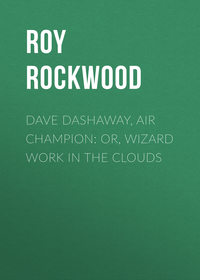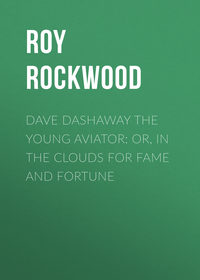 полная версия
полная версияDave Dashaway Around the World: or, A Young Yankee Aviator Among Many Nations

Roy Rockwood
Dave Dashaway Around the World; or, A Young Yankee Aviator Among Many Nations
CHAPTER I
THE COMET
“I wish Dave Dashaway would hurry up here,” said Hiram Dobbs, who was for the time being in charge of the biplane, the Comet.
“What’s your great anxiety, Hiram?” questioned Elmer Brackett, reclining comfortably in one of the spacious seats behind the pilot post of the machine.
“Do you know that fellow with the long frock coat over yonder – the one who looks like some cheap sharp lawyer? There,” added Hiram, pointing at a group near a hangar, “he’s talking now with that fat, porpoise-looking man with gold braid on his cap and a badge on his coat.”
“I see them,” nodded young Brackett. “Never saw either before that I can remember. What of them?”
“Just this,” replied the young airman, quite seriously. “That lawyer fellow has been rustling around like a hen on a hot griddle for the last ten minutes. He seemed to be waiting for someone. Then I saw that man with the light fuzzy hat, and a moustache and glasses, come in a great hurry up to him, and direct his attention to the airship here. Just now the same fellow pointed it out to that constable – policeman – or whatever he is.”
“I declare!” exclaimed Elmer, with a start, sitting up and taking notice. “Why, I know the man with the fuzzy hat.”
“You do?”
“I am sure of it, Hiram. He is disguised, but I certainly recognize him. That fellow is my enemy,” and the speaker shifted around in his seat, greatly disturbed. “Do you remember that fellow Vernon?”
“I should say so, and I suspected it to be just that individual all along,” explained Hiram. “He’s made all of us trouble enough not to be forgotten.”
“I wish Dave would come,” said Elmer, anxiously. “It would be a terrible thing if, after all my hopes and preparations, something should come up to prevent my going with you on the great airship trip around the world.”
Elmer Brackett spoke very earnestly. He might well do so. When he referred to an exploit that sounded like the scheme of some visionary, his words had a tangible and sensible business basis.
His companion was pretty nearly a professional airman, and Elmer himself knew a great deal about aircraft. His father was practically the owner of the Interstate Aero Company. The person they were now awaiting, Dave Dashaway, was a youth who had won fame and fortune in the aviation field.
Young as Dave was, this expert had pretty nearly reached the top as a professional airman. Those who have been introduced to him in the first book of the present series, named “Dave Dashaway, the Young Aviator,” will recall with interest his first struggles to earn recognition and a living in a line to which he was naturally adapted. Dave Dashaway’s father had been a scientific balloonist, and when Dave met the old aviator, Robert King, he found a man who was glad to help him on in his ambition to succeed as a sky sailor.
Dave steadily and earnestly studied aeronautics as if he was learning a trade. In the second volume of this series, entitled “Dave Dashaway and His Hydroplane,” the energetic young airman won marked distinction at an aero meet by his monoplane and hydroplane work. His ability won the attention of a friend and former professional associate of his father, and the latter agreed to finance the most stupendous aerial proposition ever attempted.
The result has been told in the preceding volume of this series called, “Dave Dashaway and His Giant Airship.” The remarkable adventures of Dave and his friends while sailing the mammoth airship, the Albatross, across the Atlantic Ocean have there been narrated. After the giant airship had started on its extraordinary trip, a stowaway had been discovered – Elmer Brackett.
It seemed that the lad had gotten into bad company. His father was rich and he had plenty of money, which he spent very foolishly. He had formed the acquaintance of a clever schemer named Vernon. This man had so enmeshed Elmer in his toils, that he made the boy believe that he could send him to prison, and ruin his father’s business. All this was untrue, but in sheer desperation, believing he had wrecked all his chances in life, the frightened lad had secretly stolen aboard of the Albatross. In a very heroic way he had saved the crew of the giant airship from capture by some mountain outlaws in North Carolina, where the Albatross had descended for repairs. This had made him a welcome comrade to Dave and Hiram. When the former returned to the United States, victor in the great race across the Atlantic and the possessor of a small fortune in prize money, his first task was to hunt up the schemer, Vernon. Dave gave the rascal to understand that if he annoyed Elmer any further, he would find himself in serious trouble.
For all that Dave Dashaway and the powerful friends he had made did, however, Vernon was slow to abandon his hope of fleecing his victim out of more money. He tried to blackmail Mr. Brackett, and even brought a suit against the wealthy manufacturer on some notes he had induced the son to sign under false pretences. To get rid of him, Mr. Brackett had finally given Vernon a sum of money to cease his annoying persecutions. Then Vernon had disappeared, and Dave had supposed that he was “off the map” for good.
Elmer had acted like a new being since coming under the healthy influence of the brisk, high-minded young airman, Dave Dashaway, and his ardent assistant, Hiram Dobbs. For the first time in his life, the zest of adventure and the ambition to make something of himself had acted like a spur on the young fellow.
For over a month our hero, Dave, and his two loyal comrades had led an existence of delight. The young airman had become greatly interested in an exploit in which he had been invited to take part. The National Aero Association had arranged for a wonderful novelty and a test in the aviation field. This was nothing less than an aeroplane race around the world.
The route had been marked out, the prizes announced and the rules of the contest adopted. Nearly half a score of contestants had registered. In the official list there had been published a line or two that the adventurous Hiram read proudly a dozen times a day: “Entrant VI – the biplane Comet, pilot Dave Dashaway.”
An aero meet was now in progress near the city of Washington, which was to be the starting point of the great race. Dave and his young assistants had fairly lived at the plant of the Interstate Aero Company. Every facility of the great factory had been placed at the command of Dave. The result had been the construction of the Comet, probably the most perfect and splendid aircraft ever built.
There was a permanent aero practice field near the factory, and on the afternoon when our story opens the Comet was ready to make its daily trial flight. With the morrow, entirely equipped and its crew aboard, the model biplane was to sail across the country for Washington, to be on hand for the start of the race around the world a few days following.
Other skycraft were in practice or motion about the field. Hiram and Elmer had gotten their machine in order for a non-stop flight of one hundred miles. They were waiting for the arrival of Dave, when Hiram made the discovery that upon the very eve of their grand and stimulating star exploit, an old enemy had suddenly appeared upon the scene.
Hiram Dobbs bent a keen, suspicious glance at the three men whom he had pointed out to his comrade. A worried look came into Elmer’s face as he, too, watched them.
“Yes,” said the latter in an uneasy tone, but convincedly, “one of those men is Vernon.”
“And the others are a lawyer and an officer of the law,” added Hiram. “There’s something afoot, Elmer. I guess what it is and – I’ll fool them.”
“The constable is coming this way!” exclaimed Elmer, apprehensively.
“He won’t get here quick enough,” declared Hiram. “I see through their tricks – Vernon is bent on having you arrested on some flimsy charge. The scoundrel counts on the belief that your father will pay him more money rather than see the Comet delayed for the race. We’ll disappoint him.”
The speaker shot out his hand to the wheel. His foot was ready to depress the self-starter button.
“All clear?” he called to the field man who stood close by, and the latter nodded and waved his hand.
“The constable is running towards us,” said Elmer rapidly.
Chug! chug! The Comet rose from the ground. Elmer Brackett uttered a great sigh of relief. Hiram chuckled softly to himself.
“Hold on! I’ve got a warrant! In the name of the law – ugh!”
The Comet gave a great sway. Its pilot dared not relax attention to his duties, but he shot a swift glance at the source of the outcry.
“The mischief!” uttered Hiram, in surprise and concern.
The big bulky constable was clinging to the machine body, his feet dangling, his face white and scared-looking, swaying helplessly except for his frantic hand-hold fifty feet above the ground!
CHAPTER II
AN INVOLUNTARY PASSENGER
Dave Dashaway’s assistant knew his business too well to attempt any rash or reckless change in the course of the biplane. At a glance Hiram had taken in the situation. In a flash he gave the right order.
“Help him – pull him in,” he directed.
“Yes, he’ll smash the wing and we’ll all go down in a heap if he hangs on there,” declared Elmer, quickly.
“Let me off! Let me off!” puffed and panted the constable. “Help! I’ll drop! Murder! I’m a goner!”
“Easy, officer!” cried out Hiram, in his clear, ringing tones. “Don’t get rattled or you’ll be gone, indeed.”
Elmer had grasped the arm of the clinging man. He had strapped himself into his seat, and this position assisted in giving him a tugging strength that counted for something. The white, scared face of the constable came nearer and nearer to him. Through great efforts the trespasser was hauled up over his center of balance, and he tumbled into the vacant seat all in a heap.
“Let down this balloon! I’ve got a warrant,” began the constable, breathlessly – “oogh!”
A whirl of the biplane sent the man banging against the side of the seat till his teeth rattled.
“Strap him in,” called out Hiram, “if he don’t want to get a spill.”
“Oh, my! Stop! Please stop! Let me out!”
Meantime Elmer had snapped the belt in place. It was well that he had acted speedily. The Comet made a switch just there which caused the involuntary passenger to tremble with terror, yell outright, and crouch back in his seat.
Hiram directed a smooth volplane and made an even spurt of speed on a set level. This gave the intruder a chance to steady his nerves and regain his breath. He was still, however, big-eyed and chattering. The young pilot dared not direct attention from his task of running the machine, but he managed to turn his face sideways so as to give Elmer a significant glance. The latter half smiled as he understood what was on the programme.
“Now, see here, officer,” spoke Hiram, past his shoulder, “I can’t give you any further attention than to tell you what to do. If the machine tips – ”
“Is there danger?” gasped the overcome constable. “Say, please go down! Easy, you know! P-please-p – please!”
“You had better show some sense,” retorted Hiram, with pretended sternness. “There is always danger of a spill. Don’t help it any.”
“N-no, I won’t,” chattered the officer. “I – I’ll do just what you tell me.”
“Then sit still and keep still. Elmer, get him into that airman armor. He’s pretty bulky, and if we take a flop – ”
“Br-rr-r!” shivered the unfortunate passenger. “Oh, don’t talk about it!”
“Get the aerodrome safety helmet on him,” pursued Hiram. “It will save his head if he tumbles.”
“Say, I don’t want to! You’ve got to stop! I’m an officer of the law and I order you to lower this balloon.”
“You want to drop, do you?” called back Hiram, “All right, if you say so, only – ”
“No! no! no!” fairly bellowed the constable, as the pilot described a manœuvre pretty near to accomplishing a “shoot-the-chutes” dive in aviation. “You know best. I’ll do as you say.”
He allowed Elmer to fasten on the helmet as the machine steadied. It made his big shock-haired head look bigger than ever.
“Now then, the felt safety buffers,” directed Hiram, and his willing accomplice bundled the passenger in between two thick pads covering chest and shoulders like a wad of pillows.
“He’d better have the earflaps and respirators if you’re going up into the rarefied air,” suggested Elmer, solicitously.
“Don’t go! Say, I’m not well! This air is good enough for me,” remonstrated the constable.
“Now for the non-concussion girdle,” ordered the merciless pilot.
Elmer was almost bursting with suppressed merriment. He was so sure that Hiram knew his business and that no real danger was imminent in that calm air with a perfect head breeze, that he enjoyed the occasion immensely.
By this time their frantic fellow passenger resembled a diver, swathed as he was in thick leather safety devices crowned with steel. Muffled up and helpless, he squirmed, groaned and closed his eyes with a sickening shudder every time he glanced over the edge of the machine. The unusual sight of the earth fading away, the swift passage of the landscape, fairly chilled him.
For five or ten minutes the passenger was content to remain mute, trying to realize and become accustomed to his unexpected condition. The machine had a duplicate control system. That is, the rudder wires ran to the right hand second seat as well as to that of the pilot. This made it possible for Hiram to confine his attention exclusively to spark and throttle control, while his assistant could cooperate as to the steering gear whenever the tail trailed heavily. Elmer, too, could cooperate in the aileron and elevator control, and the flight settled down to a smooth, perfect rush through the atmosphere.
“Ahem,” ventured their passenger as he regained his scattered wits. He spoke in a vague, uncertain tone. “I told you that I had a warrant and I want to explain – whew!”
Hiram Dobbs was bound to shut off the passenger from any official complication of matters. His eye had been fixed to a row of hills ten miles distant. He had marked out his course and he had a definite destination in view. Just now he stirred up the officer considerably with a new joggling twist of the machine, just as he had planned to do. The fright of the constable was renewed. He forgot what he had started to say.
“What’s the programme?” whispered Elmer, bending over close to the ear of the pilot.
“I want to get you to a point of safety before that fellow has a chance to read that warrant of his,” was the low-toned reply.
“I see; but how are you going to work it?” questioned Elmer, in some perplexity.
“Leave that to me,” returned Hiram, in a confident way.
“Yes, I’m going to.”
“I want to get beyond the ridge ahead – in fact, as far away from our starting point as I can.”
“I want to explain,” here again broke in their passenger. “I’ve got a document here – ”
There he stopped. Hiram had to laugh and Elmer chuckled. The constable made several ineffectual efforts to reach a pocket in his coat. The muffling devices he wore prevented him. He was like a man encased in a suit of armor.
“Never mind the document,” said Hiram. “Just tell us what it’s about.”
“It’s a warrant, and it charges this young man with trespassing on the property of a farmer with an airship. The complainant has a legal right, ipse dixit, to claim malicious intent, which makes it a criminal offense.”
“I thought so. Pretty flimsy,” remarked Hiram. “They’ve raked up some trifle to give that miserable Vernon an excuse to keep you in court for a week or more. All right officer,” he added, “read your warrant.”
“How can I read it when I can’t get my hands with these pesky things on them anywhere near my pocket?” demanded the constable, wrathily.
“Very well, then don’t say I obstructed the law by refusing you your rights.”
“When you land I’ll read the warrant,” explained the constable. “This boy has got to come with me. It’s defiance of law to refuse.”
“We will land very soon now,” promised Hiram. “Whisper, Elmer.”
The skillful pilot worked the exhaust purposely to cover a quick undertoned interview with his friend. There was a perfect understanding between them by the time the colloquy was concluded.
“All right,” said Elmer simply, and with a satisfied expression on his face, as he sank back in his seat.
The young air pilot skirted a great grove of trees and flew the Comet high above a range of hills beyond. Then, near a little town with a railroad depot showing in its midst, he prepared to descend.
Hiram made a thrilling dive that nearly sent the constable into hysterics. The Comet reached the ground and settled down upon it as safely and gracefully as a bird sinking to its nest.
“Jump out,” he said simply, to Elmer.
The latter unbuckled the seat belt promptly and leaped to the ground beside the machine.
“Hold on! Stop!” shouted the constable.
Elmer showed no disposition to run away. He only walked briskly up and down, stamping his feet and exercising his arms.
“That boy is under arrest,” continued the officer, struggling with his burden of wraps.
“Not quite yet, officer, I fancy,” retorted Hiram.
“Well, he will be soon as I get out and read my warrant. I order you to help me, young man. If you refuse, I shall complain of your aiding and abetting a criminal to escape.”
“Bah!” cried Hiram, “you know as well as I do that he is no criminal. Here,” and he assisted his passenger in getting rid of the hampering devices. “I’ll help you.”
With a great snort of relief the bulky officer stepped to the ground. His first act was to shake his cramped limbs. Then he fished in his pockets for the warrant.
“In the name of the law,” he began with assumed dignity, producing a folded document.
“Hold on,” challenged Hiram, “what are you up to?”
“I’m going to arrest one Elmer Brackett.”
“I think not,” retorted Hiram, coolly. “It seems you’ve forgotten something rather important, Mr. Officer.”
“What’s that?” snorted the constable.
“We have landed just over the state line and your warrant is no good in this locality.”
CHAPTER III
ON THE WING
The constable stared at Hiram. He glanced at Elmer with half a scowl. Then he rubbed his head as if seeking for new ideas. Finally a sort of sickly grin overspread his flabby face.
“You’d make a good lawyer,” he observed. “Over the state line I am, sure enough, with no warrant served. Well, I’m not so sorry as you may think.”
“I’m glad to hear you say so,” declared Hiram. “You’ll be glad, too, when you come to know that the man behind the gun in this case is an unmitigated rascal.”
“I didn’t know anything about that, I simply followed orders,” said the official, in a slightly apologetic tone.
“Well, good-bye, officer, I suppose I can go?” broke in Elmer.
“I shan’t hinder you. Only keep out of my territory.”
Elmer exchanged a look of mutual understanding with Hiram, and walked slowly away. He soon disappeared beyond a little thicket, heading in the direction of the town and the railroad station.
“Well, officer?” spoke up Hiram, moving about the biplane to see that everything was in order.
“Well, lad,” returned the constable, “I suppose it’s in order for me to get back home after this fool’s errand.”
“I’ll be glad to take you back with me,” said Hiram.
“Humph!” and the constable shrugged his shoulders in a dubious way. “I’m safe on the ground once more, thank goodness; and I reckon I’ll stay here.”
“Oh, come ahead in the machine,” invited the young pilot. “No capers, officer, honestly. I had to do some gliding to make you forget business till my friend was over the safety line, but I’ll take you home steady as a Pullman, I promise you.”
“No diver’s suit, though, mind you.”
“That isn’t necessary,” laughed Hiram. “Just strap yourself in and I’ll give you a nice ride.”
By the time they got back to the aero grounds the constable was as friendly as could be. He shook hands good-bye with Hiram, and winked at him and chuckled to himself as he walked over to where the lawyer-like man and the disguised Vernon stood waiting for him. They evidently had seen the Comet returning and had hastened to the grounds to hear the news.
Hiram lingered, watching the group until they disappeared. Dave Dashaway came out of the hangar as the assistants ran the biplane towards it.
Bright as a dollar, looking every inch the active, ambitious fellow his friends called him, the young airman regarded his assistant inquiringly and expectantly.
“You didn’t wait for me,” observed Dave.
“No, I was in a hurry,” laughed Hiram. “I suppose you know what was doing?”
“I’ve heard something about a warrant for Elmer. I’ve guessed out the plot. Mr. Brackett was here, quite worried.”
“He needn’t be,” declared Hiram, reassuringly. “There he is now. It’s all right, Mr. Brackett,” added Hiram, advancing to meet the wealthy manufacturer. “They didn’t get Elmer, and, what’s more, they won’t get him very soon.”
Dave Dashaway led the way into the little portable house adjoining the Comet hangar where the boys slept nights. All sat down on camp stools.
“I hope this new trouble is not going to disturb your plans,” spoke Mr. Brackett.
“Not a bit of it,” replied Hiram. “Elmer is safely out of the way, and everything is arranged to keep that miscreant, Vernon, from annoying him.”
Hiram recounted all that had transpired. The cloud of uneasiness passed from the brow of the president of the Interstate Aero Company. He smiled approvingly at the keen-witted narrator.
“Elmer will take a train and go right on to an arranged rendezvous,” explained Hiram. “He will be on hand for the start, Mr. Brackett.”
“I shall start for Washington,” announced the manufacturer. “I want to see the Comet begin the big race in which I feel Dashaway and his friends will win new laurels.”
“Thank you for your confidence in us,” said the young airman. “I expect to deserve it. There’s a reason – you have given us a biplane that is a marvel.”
“Yes,” declared Hiram, enthusiastically, “there will be nothing in the field that can even begin to compare with the Comet.”
Our hero and his assistant spent some time going over the splendid piece of mechanism, after Mr. Brackett had gone away. The highest skill had been employed in the construction of the Comet. From barograph to breeches buoy it was as nearly perfect and thoroughly equipped as money and intelligence could make it.
The biplane was of original design. It had a tube mechanism and universal bearing that were entirely new in the aviation field. The arrangements for gasoline, oil and water had been the main consideration. The capacity for carrying extra weight the second. The coverings were rubberized fabric, the machine had the very newest shock absorbers, and the double-control system admitted of a manipulation that not only divided the operation work, but added to the safety of navigation.
As to the superb balancing and self-righting powers of the Comet, the boys had demonstrated these merits only the day previous. With a ripping crash the machine had entered the perimeter of a corkscrew glide. Dave found the tilt so steep there seemed no chance to come out of the spiral. Hiram, in the second seat, by a deft, quick operation of the rudder control, changed the equilibrium. Dave did the rest, and the Comet passed a hair-breadth ground swoop clean as an acrobat.
On account of the long flights necessary, probable landings in desert spots far from civilization, and the menace of supplies giving out, the Comet had been constructed of a weight, breadth and length that would admit of the utilization of a so-called ballast pit. This was located directly behind the seats. It was compactly filled at the present time, all ready for the start scheduled for a few days later. With every article cared for, and after a close calculation of the effect of dislodgment and replacement, the young aviator in command of the machine felt that he had mastered most of the details of the prospective trip around the world.







